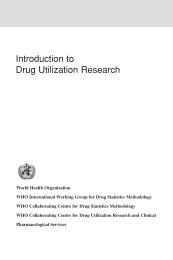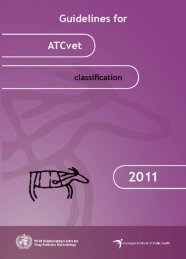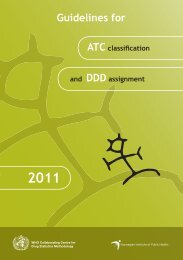- Page 1 and 2: Guidelines forATC classificationand
- Page 3 and 4: Guidelines forATC classificationand
- Page 5 and 6: PREFACEThe Anatomical Therapeutic C
- Page 7: TABLE OF CONTENTSI. Introduction ..
- Page 11 and 12: B. Present Organisational responsib
- Page 13 and 14: - To develop methods, manuals and g
- Page 15 and 16: II.THE ANATOMICAL THERAPEUTIC CHEMI
- Page 17 and 18: Two examples of this are as follows
- Page 19 and 20: Plain products are classified accor
- Page 21 and 22: Alterations in ATC classification c
- Page 23 and 24: DDDs are not established for topica
- Page 25 and 26: 2. Combination productsThe DDDs ass
- Page 27 and 28: d) Duration of treatmentThe duratio
- Page 29 and 30: D. Principles for reviewing and cha
- Page 31 and 32: Prescribed daily doseThe prescribed
- Page 33 and 34: A. Drug utilizationThe ATC/DDD syst
- Page 35 and 36: Since alterations of ATC and DDDs d
- Page 37 and 38: F. Drug costs, pricing and reimburs
- Page 39 and 40: It is left to the national users of
- Page 41: Useful sources of these data would
- Page 45 and 46: - a change in the main indication s
- Page 47 and 48: VIII. ATC/DDD INTERPRETATIVE GUIDEL
- Page 49 and 50: AALIMENTARY TRACT AND METABOLISMA01
- Page 51 and 52: AA01A01AALIMENTARY TRACT AND METABO
- Page 53 and 54: Plain antiflatulents, see A03AX - O
- Page 55 and 56: A02BBA02BCProstaglandinsProton pump
- Page 57 and 58: A03ADPapaverine and derivativesComb
- Page 59 and 60: Opioid analgesics in combination wi
- Page 61 and 62: Droperidol used for prevention of n
- Page 63 and 64: Combinations with osmotically actin
- Page 65 and 66: A07AAAntibioticsVancomycin and coli
- Page 67 and 68: A07EA07EAINTESTINAL ANTIINFLAMMATOR
- Page 69 and 70: DDDs can be difficult to establish
- Page 71 and 72: A10XA10XAOTHER DRUGS USED IN DIABET
- Page 73 and 74: A11AA03multivitamins and other mine
- Page 75 and 76: For vitamin B 1 in combination with
- Page 77 and 78: A12AX - Calcium, combinations with
- Page 79 and 80: See also:A11AA02 - multivitamins an
- Page 81 and 82: A13A13ATONICSTONICSThis group compr
- Page 83 and 84: BBLOOD AND BLOOD FORMING ORGANSB01B
- Page 85 and 86: Lysine acetylsalicylate is classifi
- Page 87 and 88: ased adhesives, are classified in V
- Page 89 and 90: B03AEIron in other combinationsThis
- Page 91 and 92: B05BLOOD SUBSTITUTES AND PERFUSION
- Page 93 and 94:
B05XAElectrolyte solutionsThis grou
- Page 95 and 96:
CCARDIOVASCULAR SYSTEMC01C02C03C04C
- Page 97 and 98:
CC01C01ACARDIOVASCULAR SYSTEMCARDIA
- Page 99 and 100:
C01CCARDIAC STIMULANTS EXCL. CARDIA
- Page 101 and 102:
C01EOTHER CARDIAC PREPARATIONSThis
- Page 103 and 104:
Combinations with other antihyperte
- Page 105 and 106:
C02DDC02DGNitroferricyanide derivat
- Page 107 and 108:
C02LNC02LXC02NSerotonin antagonists
- Page 109 and 110:
C03BBSulfonamides and potassium in
- Page 111 and 112:
C04ACNicotinic acid and derivatives
- Page 113 and 114:
C05BAHeparins or heparinoids for to
- Page 115 and 116:
C07BGAlpha and beta blocking agents
- Page 117 and 118:
Combinations with ACE inhibitors ar
- Page 119 and 120:
C09BBACE inhibitors and calcium cha
- Page 121:
C10BLIPID MODIFYING AGENTS, COMBINA
- Page 124 and 125:
D10D11ANTI-ACNE PREPARATIONSA Anti-
- Page 126 and 127:
D01ACImidazole and triazole derivat
- Page 128 and 129:
D02AXOther emollients and protectiv
- Page 130 and 131:
D04ABAnesthetics for topical useAt
- Page 132 and 133:
D06AATetracycline and derivativesCo
- Page 134 and 135:
The group is subdivided according t
- Page 136 and 137:
D08ABAluminium agentsCombinations w
- Page 138 and 139:
D10AACorticosteroids, combinations
- Page 140 and 141:
D11AXOther dermatologicalsThis grou
- Page 142 and 143:
GG01GENITO URINARY SYSTEM AND SEX H
- Page 144 and 145:
G02OTHER GYNECOLOGICALSAnalgesics u
- Page 146 and 147:
G02CCAntiinflammatory products for
- Page 148 and 149:
G03ADEmergency contraceptivesLevono
- Page 150 and 151:
G03CXOther estrogensTibolone is cla
- Page 152 and 153:
package which is intended for one c
- Page 154 and 155:
G04BCUrinary concrement solventsThi
- Page 157 and 158:
HSYSTEMIC HORMONAL PREPARATIONS, EX
- Page 159 and 160:
The DDDs are based on the treatment
- Page 161 and 162:
H02ACORTICOSTEROIDS FOR SYSTEMIC US
- Page 163 and 164:
H04H04AH04AAPANCREATIC HORMONESGLYC
- Page 165 and 166:
JANTIINFECTIVES FOR SYSTEMIC USEJ01
- Page 167 and 168:
J01ANTIBACTERIALS FOR SYSTEMIC USET
- Page 169 and 170:
inhibitor are classified at a separ
- Page 171 and 172:
The DDDs for the sulfonamides are r
- Page 173 and 174:
The DDDs for the aminoglycosides ar
- Page 175 and 176:
J01XXOther antibacterialsPreparatio
- Page 177 and 178:
J04ADJ04AKJ04AMThiocarbamide deriva
- Page 179 and 180:
J05AGNon-nucleoside reverse transcr
- Page 181 and 182:
J07AGHemophilus influenzae B vaccin
- Page 183:
J07BFPoliomyelitis vaccinesPoliomye
- Page 186 and 187:
LANTINEOPLASTIC AND IMMUNOMODULATIN
- Page 188 and 189:
L01DBL01DCAnthracyclines and relate
- Page 190 and 191:
L02BXOther hormone antagonists and
- Page 192 and 193:
L04ACL04ADL04AXInterleukin inhibito
- Page 194 and 195:
MM01M01AMUSCULO-SKELETAL SYSTEMANTI
- Page 196 and 197:
The DDD for glucosamine refers to g
- Page 198 and 199:
Combined preparations containing no
- Page 200 and 201:
M03CMUSCLE RELAXANTS, DIRECTLY ACTI
- Page 202 and 203:
M05BXOther drugs affecting bone str
- Page 204 and 205:
NN01NERVOUS SYSTEMANESTHETICSNo DDD
- Page 206 and 207:
N01BCN01BXEsters of benzoic acidOth
- Page 208 and 209:
The DDDs are based on approved dose
- Page 210 and 211:
This means that a product containin
- Page 212 and 213:
Antivertigo preparations, see N07.C
- Page 214 and 215:
All other benzodiazepines are class
- Page 216 and 217:
N05AANTIPSYCHOTICSThis group compri
- Page 218 and 219:
The parenteral DDD for chlordiazepo
- Page 220 and 221:
N05CFN05CHBenzodiazepine related dr
- Page 222 and 223:
N06BXOther psychostimulants and noo
- Page 224 and 225:
N07BCDrugs used in opioid dependenc
- Page 226 and 227:
PANTIPARASITIC PRODUCTS, INSECTICID
- Page 228 and 229:
P01BCMethanolquinolinesCombined pre
- Page 230 and 231:
P02ANTHELMINTICSThe anthelmintics a
- Page 232 and 233:
P03AECTOPARASITICIDES, INCL. SCABIC
- Page 234 and 235:
RRESPIRATORY SYSTEMInhaled antiinfe
- Page 236 and 237:
R01BNASAL DECONGESTANTS FOR SYSTEMI
- Page 238 and 239:
The DDDs for inhalation aerosol and
- Page 240 and 241:
R03BXOther drugs for obstructive ai
- Page 242 and 243:
Fixed DDDs are assigned for combina
- Page 244 and 245:
R05XOTHER COLD PREPARATIONSThis gro
- Page 246 and 247:
R07AALung surfactantsThis group com
- Page 248 and 249:
SSENSORY ORGANSA formulation approv
- Page 250 and 251:
S01CBCorticosteroids/antiinfectives
- Page 252 and 253:
S01GXOther antiallergicsCombination
- Page 254 and 255:
S02OTOLOGICALSSmall amounts of anti
- Page 256 and 257:
S03AS03AAANTIINFECTIVESAntiinfectiv
- Page 258 and 259:
V10V20THERAPEUTIC RADIOPHARMACEUTIC
- Page 260 and 261:
Silibinin, which is also used in am
- Page 262 and 263:
V04V04BDIAGNOSTIC AGENTSURINE TESTS
- Page 264 and 265:
V06DXOther combinations of nutrient
- Page 266 and 267:
V08BV08BAX-RAY CONTRAST MEDIA, NON-
- Page 268 and 269:
V09E - Respiratory system.Technetiu
- Page 270 and 271:
V09HINFLAMMATION AND INFECTION DETE
- Page 272 and 273:
Iobenguane ( 131 I) in low dose for
- Page 274 and 275:
DDDs per 100 bed days Applied when
- Page 276 and 277:
276
- Page 279 and 280:
WHO COLLABORATING CENTRE FORDRUG ST
- Page 281:
ANNEX II
- Page 284:
ORDER FORM - ATC/DDD PUBLICATIONSPa





